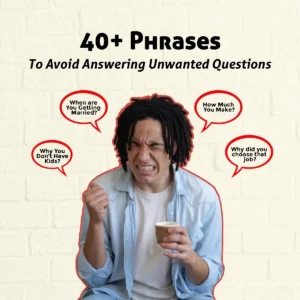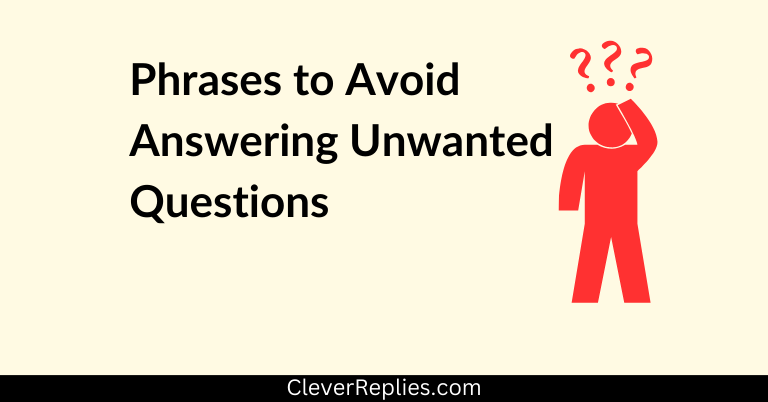40+ Phrases to Avoid Answering Unwanted Questions
Unwanted questions— They sneak into conversations when you least expect them.
From family gatherings to workplace chatter, questions like ‘Why aren’t you married yet?‘ or ‘How much do you make?‘ can instantly turn small talk into a high-stakes interrogation.
The good news? You don’t have to answer them.
With the right approach, you can gracefully sidestep intrusive inquiries, saving your time, energy, and peace of mind.
In this article, we’ll teach you ‘40+ Phrases to Avoid Answering Unwanted Questions’ with grace.
Let’s dive in!
How to Avoid Answering Unwanted Questions?

The key to avoiding a question gracefully lies in your ability to redirect the conversation or respond in a way that keeps the interaction light and respectful.
Here are a few strategies to dodge unwanted questions without causing offense:
1. Politely Deflect the Question
Politeness can be your best shield when avoiding a question. Redirecting the conversation with curiosity or a neutral comment can help shift the focus.
- “That’s an interesting question! I’m not sure I have the best answer, but what about you?”
- “Oh, that’s a tricky one—I’ll have to think about it. In the meantime, how have you been?”
By showing genuine interest in the other person or steering the topic in a different direction, you maintain the flow of conversation without addressing the question directly.
2. Use Humor to Lighten the Mood
Humor is a powerful tool—it can defuse tension and make the exchange more enjoyable for everyone.
- “If I answered that, I’d have to erase your memory, Men in Black style!”
- “Oh no, you’re trying to get me in trouble, aren’t you?”
This approach works particularly well when the setting is casual or when the question itself feels lighthearted. Humor keeps the conversation playful, leaving no room for awkwardness.
3. Respond with Vagueness
Sometimes, less is more. When you don’t want to give a concrete answer, use vague language to keep things ambiguous.
- “Oh, it’s a long story—it’s hard to explain in a few words.”
- “That’s something I’m still figuring out myself, honestly.”
This technique is especially useful when you’re not ready to discuss the topic or feel that details aren’t necessary.
4. Turn the Question Around
If you’re uncomfortable with answering, shift the spotlight back onto the other person.
- “Why do you ask? Is it something you’ve been curious about too?”
- “That’s an interesting angle. What’s your take on it?”
This tactic not only deflects the question but also helps you understand the intent behind it. Sometimes, people don’t realize their questions are intrusive until they’re asked to explain themselves.
By doing this, you can regain control of the conversation while showing genuine interest in their perspective.
5. Redirect the Topic Entirely
A subtle change of topic can do wonders when you want to steer clear of answering.
- “That’s an interesting thought! Speaking of that, did you catch the latest news about [topic]?”
- “Oh, before I forget, I wanted to tell you about [event/product/experience].”
Smooth transitions are key here. Use the original question as a springboard to bring up something you’re more comfortable discussing.
6. Politely Decline to Answer
Sometimes, the best way to avoid a question is to be upfront—without being confrontational.
- “I appreciate your interest, but I’d rather keep that private for now.”
- “That’s a bit personal, so I’d prefer not to share. Hope you understand!”
This method requires confidence, but it’s highly effective in setting boundaries. It’s particularly important for dealing with overly intrusive questions.
40+ Phrases To Avoid Answering Unwanted Questions

Sometimes, all you need is a go-to phrase to dodge a question.
Below are some effective phrases categorized by tone and context to help you navigate any tricky situation. Feel free to adjust them to suit your style.
1. Polite and Neutral Phrases
- “I’d rather not say, but thank you for asking.”
- “I don’t have a clear answer for you right now.”
- “Let me get back to you on that one sometime later.”
- “Let’s circle back to that later—now isn’t the best time.”
- “That’s a great question! I’ll need to think about it a bit more.”
- “I appreciate your curiosity, but I’d prefer to keep that private.”
- “That’s a bit personal for me to share, I hope you understand.”
- “I’d like to focus on something else for now, if you don’t mind.”
- “I’m not the best person to answer that, but thanks for asking.”
- “I’d prefer to keep that between me and [relevant person/group].”
2. Funny and Humorous Phrases
- “That’s a secret I’m taking to my grave!”
- “If I told you, it would ruin the plot twist!”
- “I’ll tell you, but only if you promise not to laugh!”
- “If I answer that, I might just implode with awkwardness!”
- “I’m not sure you’re ready for the truth—prepare yourself!”
- “I’m going to need a few hours and a snack before I answer that!”
- “You know, I’d answer, but I’m in the middle of a top-secret mission!”
- “Oh, that’s a million-dollar question! Unfortunately, I’m on a budget.”
- “Well, that’s a long story, and I’m not sure we have that much time!”
- “Ah, that’s one of those ‘if I tell you, I’ll have to disappear forever’ kinds of questions!”
3. Vague or Deflective Phrases
- “I’m still figuring things out on that front.”
- “That’s a story for another day, trust me!”
- “I haven’t really thought about that much.”
- “Oh, it’s a bit complicated to explain right now.”
- “Hmm, I’ll have to get back to you on that one.”
- “You know, I’m not even sure myself at this point.”
- “Let’s focus on something more exciting instead!”
- “Oh, it’s not really worth diving into at the moment.”
- “It’s a bit of a gray area, so I’d rather not go into it.”
- “It’s hard to say for sure—there are so many factors involved.”
4. Assertive Phrases for Setting Boundaries
- “That’s a little too personal for me to share openly.”
- “That’s a bit personal—I’d prefer to keep it private.”
- “I don’t think this is the right time to talk about that.”
- “I’d rather not discuss that, but thank you for understanding.”
- “That’s not a question I’m comfortable answering right now.”
- “I prefer to keep certain things private, and this is one of them.”
- “I’m not comfortable sharing that, and I hope you can respect that.”
- “That’s a topic I’d like to keep private, but I appreciate your interest.”
- “I’m happy to talk about something else, but I’d like to skip that topic.”
- “I’m setting a boundary around that topic—it’s not something I want to share.”
5. Phrases That Redirect the Conversation
- “Oh, that reminds me, I meant to ask you about [different topic].”
- “Before I forget, did you see [news, event, or something trending]?”
- “I’d love to discuss that later, but I’m curious—what’s new with you?”
- “Funny you mention that! It reminds me of [neutral, unrelated story].”
- “Oh, I have to tell you about this amazing thing that happened to me recently!”
- “That’s a good point—what’s your opinion on [related but non-personal topic]?”
- “Wow, great question! You know, it reminds me of [some light anecdote or idea].”
- “Good question, but I’ve been meaning to ask—have you tried [activity/product/place]?”
- “I’m not sure, honestly. By the way, have you made any exciting plans for the weekend?”
- “That’s worth discussing another time. Speaking of conversations, how’s your family doing?”
Final Words
Not every question deserves an answer, and that’s perfectly okay.
Avoiding unwanted questions doesn’t mean you’re being rude or evasive—it’s about protecting your boundaries and maintaining control of your conversations.
Whether you choose to respond with humor, tact, or redirection, the important thing is to stay true to yourself.
With these tips and phrases in your back pocket, you can handle even the trickiest situations with confidence, humor, and grace.
So the next time someone puts you on the spot, you’ll know exactly how to respond—and steer the conversation where you want it to go.
FAQs
1. How to Avoid Questions About Your Personal Life?
To avoid questions about your personal life, it’s important to set boundaries with others. Politely explain that you prefer not to discuss personal matters. If the conversation veers toward uncomfortable territory, you can steer it back to a more neutral or work-related topic.
2. How to Avoid Answering Personal Questions at Work?
If someone asks a personal question, you can politely set boundaries and let them know that you’re not comfortable sharing personal details. Offering a brief response like, “I’d rather keep my personal life separate from work,” or simply changing the subject can help maintain professionalism while avoiding the topic.
3. How Do I Stay Calm When Someone Asks a Question I Don’t Like?
Take a deep breath and pause before responding. This moment of reflection helps you avoid reacting impulsively. Focus on the bigger picture rather than the discomfort caused by the question. If necessary, politely explain that you prefer not to answer and guide the conversation to a more comfortable subject.
4. How Can I Avoid Answering Personal Questions During a Job Interview?
Politely steer the conversation back to your qualifications or the job’s responsibilities. If the question is inappropriate, you can respond with something like, “I’d prefer to focus on how my skills align with the job.”
5. How Do I Politely Refuse to Answer a Question Without Offending Someone?
Say something like, “I’m not comfortable discussing that,” or “I’d prefer to keep that private.” If the situation allows, offer to answer a different question or change the subject.
Similar Articles:
- 8 Ways to Handle Unwanted Questions to Make Sure You’ll …
-
17 Amazing Tricks for Dodging Unwanted Questions – Best Life

